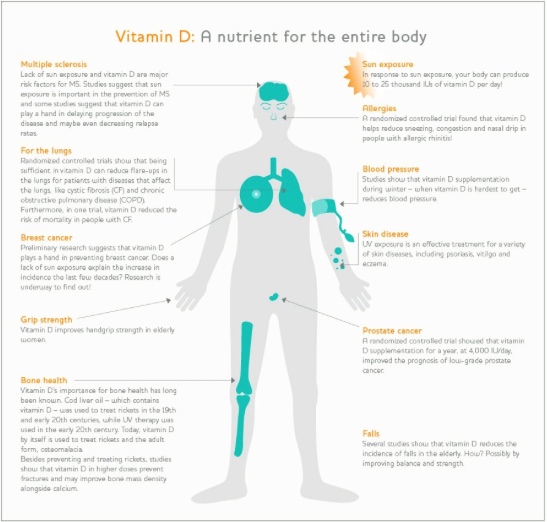Vitamin D and weight loss
Vitamin D and weight loss has been a surprising outcome of all the research that's been done into the benefits of maintaining an optimal Vitamin D level in our bodies.
Covid and the effects of global lockdowns have really thrown Vitamin D into the highlight as more and more people are now not only are very focussed on optimum health but seem to have a little more time on their hands to do the research.
Direct links are also being investigated further between belly fat and even obesity with Vit D deficiencies.
 Embracing sunshine for optimal Vit D creation
Embracing sunshine for optimal Vit D creationVitamin D and weight loss studies
Researchers from the University of Minnesota put together a diet study with 38 obese men and women.
The results revealed a possible correlation between vitamin D and weight loss. Dr. Shalamar Sibley, as head of the study, said those that followed the diet plan without any supplementation, lost about half a pound less than those who supplemented with Vitamin D.
Although not radical in the amount of weight lost, it seems to have been significant enough for scientists to want to know if there may just be a possibility that a deficiency in Vitamin D is a linked cause of obesity, or whether obesity itself causes the vitamin D deficiency.
So we can't all rush out and start taking Vitamin D supplements and expect to lose a whole lot of weight. Especially as you can overdo supplementation.
However, it's very encouraging to know that by boosting one's overall health status with a healthy Vitamin D level, one could observe the effects on losing some of that unwanted weight?
Vitamin D and weight loss : the synthase link

Another encouraging aspect for me of what is known, is that the Vitamin D created in our bodies through photosynthesis and the sun's UVB rays, in conjunction with calcium, will help us to properly assimilate our food and regulate normal blood sugar levels.
With a lack of calcium, which is actually often brought about due to a shortage of vitamin D, our bodies will increase the production of synthase, which is a fatty acid enzyme that converts calories into fat.
It is this increased synthase production, sometimes thought to be as much as 500 percent, that is believed to be the link between low levels of vitamin D and obesity. So I look forward to an increase in the research on the link between Vitamin D and weight gain as it appears extremely worthwhile.
Scientific research has really only just begun to scratch the surface of the role Vitamin D plays in the overall health status of us humans. It is only in the last few decades that enough research has been done to raise the interest sufficiently enough that many different research teams have started on Vitamin D projects.
Results such as that published in the Archives of Internal Medicine, where 75% or more of American teens and adults had been found to be deficient in vitamin D, together with the fact that deficiency is linked to many illnesses including the serious ones of cancer, diabetes and heart disease, is raising the bar of interest with people wanting to know more about these Vitamin D health benefits.
Another clinical study, conducted in April 2000, revealed that patients who were bound to wheelchairs because of chronic fatigue and body weakness became mobile after just six weeks of supplementation with 50,000 IU of vitamin D per week.
Other studies including those with different types of cancer, heart disease or diabetes, have shown and continue to show remarkable healing results when vitamin D levels are boosted sufficiently.
Vitamin D and weight loss impacted by deficiencies
 Skin types affect VIT D efficiencies
Skin types affect VIT D efficienciesAlthough the body create vitamin D as described, some people are potentially more at risk of a deficiency than others due to these factors:
- Skin color: High pigmentation in the skin reduces the body’s ability to absorb ultraviolet B (UVB) rays from the sun. Absorbing sunlight is essential for the skin to produce vitamin D.
- Lack of sun exposure: People who live in northern latitudes or areas of high pollution, work night shifts, or are indoors-bound should aim to consume vitamin D supplements
- Breastfeeding: The American Academy of Pediatrics recommends that all breastfed infants receive 400 international units (IU) per day of oral vitamin D.
- Older adults: The skin’s ability to synthesize vitamin D decreases with age. Older adults may also spend more time indoors.
- Limitation in fat absorption: Vitamin D is fat-soluble, meaning intake is dependent on the gut absorbing dietary fats. Conditions that limit fat absorption can decrease vitamin D intake from the diet.
- Obesity: High levels of body fat can limit the body’s ability to absorb vitamin D from the skin.
- Gastric bypass: This surgery bypasses a part of the upper intestine that absorbs large amounts of vitamin D, so can result in a deficiency.
Supplements of Vitamin D and weight loss

Although current guidelines are somewhat confusing with their different suggestions of daily supplements ranging anywhere from 400 and 1500 IU, recent research is suggesting that these levels may be too low.
Getting between 4,000 and 10,000 IU a day will have a much more therapeutic effect, boosting health and fending off disease.
The most natural and healthiest way to get Vitamin D is through direct access to the sun's UVB rays, without letting yourself get sun burnt. Just 10 - 20 minutes per day in the midday sun, without any sun protection, will allow your skin time to create the equivalent of about 5000 IU's vitamin D. Of course skin types vary a lot so you need to understand how your skin copes with the sun and manage your time accordingly.
If access to the outdoors and sufficient sunshine is not possible for you for whatever reason or through a choice not to be exposed to the sun, supplementation for vitamin D3 is rather easy and not very expensive at all.
A Vitamin D blood test is highly recommended prior to boosting your levels though, as you may find they are perfectly fine!
Once you know that the status is your vitamin D levels are low, you can embark on a supplementation program to assist with weight loss.
Vitamin D and Weight Loss - should I take supplements?
According to the National Institute of Health in the USA, taking supplements that contain both vitamin D and calcium can assist in weight loss programs.
However, scientists are not yet agreed on whether weight loss programs should include both Vitamin D and calcium or just vitamin D.
What they do say, is that although vitamin D might not help you lose weight on its own, increasing your vitamin D intake could support your weight loss efforts while enhancing your overall health. Even if weight loss doesn't happen, the bonus will be the boost for strong bones and osteoporosis prevention, a stronger heart and overall immune system, amongst other benefits.
Needless to say, Vitamin D is not a magic bullet. Weight loss will almost always need to include a healthy diet and good exercise.
Vitamin D alone is definitely not the miracle cure!

So, if you do decide to go ahead and take vitamin D supplements, please be very aware that there is such a thing as vitamin D toxicity.
An excessive amount of vitamin D may induce nausea and vomiting, loss of bone density and bone breaks, plus other complications.
So it is not advisable to take more than 2000 IU per day without prior consultation with a health practitioner.
Foods for Vitamin D and Weight Loss
In a 2010 study from the American Journal of Clinical Nutrition, researchers studied 126 overweight women, all of whom were followed for six months. Their conclusion reported that boosting your levels of vitamin D, as well as your intake of dairy-derived calcium, may increase the likelihood of losing weight, especially while dieting.
Even though vitamin D is found in some foods such as oily fish and fortified cereals and milk, taking supplements may be a more reliable means of increasing your vitamin D levels in the effort to promote weight loss.
Exposure to the sun if it's possible, is the healthiest, best option of boosting your Vitamin D levels, providing you take care not to overdo it of course and that's another subject entirely!
Vitamin D and Weight Loss for postmenopausal women
According to a 2007 study reported in the Archives of Internal Medicine on 36,282 postmenopausal women who were assigned to receive 400 IU of vitamin D and 1,000 mg of calcium in supplement form or a placebo daily, Vitamin D may help thwart the weight gain that often occurs in middle-aged women.
After three years of Vitamin D and calcium supplement-taking, those participants who had skimped on calcium prior to the study were found to be 11 percent less likely to gain weight, compared to those assigned to a placebo.
Vitamin D and Weight Loss - Heart Health Benefits
Besides losing weight, Vitamin D may provide enhanced benefits to just weight loss.
In tests on 63 overweight or obese women assigned to a weight loss program, as reported in a 2007 study in the American Journal of Clinical Nutrition, scientists discovered that those who took 400 IU of vitamin D and 1,200 mg of calcium in supplement form daily during the course of their 15-week diet had greater improvements in their cholesterol levels, compared to those given a placebo for the same time period.
References for vitamin D and weight loss
Medical News Today - Link between weight loss and Vitamin D
Natural News - Vitamin D promotes weight loss
Caan B, Neuhouser M, Aragaki A, Lewis CB, Jackson R, LeBoff MS, Margolis KL, Powell L, Uwaifo G, Whitlock E, Wylie-Rosett J, LaCroix A. "Calcium plus vitamin D supplementation and the risk of postmenopausal weight gain." Arch Intern Med. 2007 May 14;167(9):893-902.
Foss YJ. "Vitamin D deficiency is the cause of common obesity." Med Hypotheses. 2009 Mar;72(3):314-21.
Major GC, Alarie F, Dor J, Phouttama S, Tremblay A. "Supplementation with calcium + vitamin D enhances the beneficial effect of weight loss on plasma lipid and lipoprotein concentrations." Am J Clin Nutr. 2007 Jan;85(1):54-9. National Institutes of Health. "Vitamin D: MedlinePlus Supplements". January 2011.
Shahar DR, Schwarzfuchs D, Fraser D, Vardi H, Thiery J, Fiedler GM, Blher M, Stumvoll M, Stampfer MJ, Shai I; DIRECT Group. "Dairy calcium intake, serum vitamin D, and successful weight loss." Am J Clin Nutr. 2010 Nov;92(5):1017-22.
Have a question yourself?
Do you have a question or perhaps wish to make a comment or even tell a story about an experience with sunscreen? Please share it! Others will benefit and may join the conversation.







